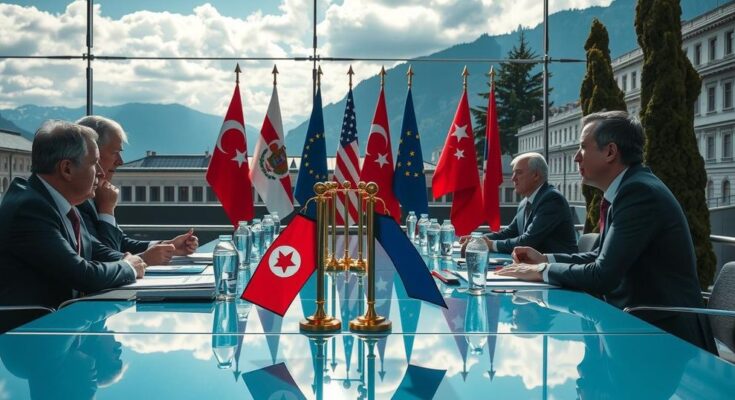Iran and the E3 countries—Germany, France, and the UK—initiated confidential discussions in Geneva regarding Iran’s nuclear program just prior to Trump’s return to power. The primary focus was on lifting sanctions and addressing nuclear concerns amid heightened tensions following recent advancements in Iran’s nuclear capabilities. Both sides acknowledged the need for a conducive environment for further negotiations as regional security issues loom large.
Iran and the major European powers, specifically Germany, France, and the UK, convened in Geneva for two days of discussions on Iran’s nuclear program, occurring just one week prior to Donald Trump’s inauguration as President of the United States. These discussions come in the wake of prior confidential negotiations held in the same city, reflecting ongoing Western concerns regarding advancements in Iran’s nuclear capabilities.
Details of the meeting have been kept highly confidential; however, reports confirm that Iranian Deputy Foreign Minister Majid Takht-Ravanchi held consultations with counterparts from the E3 countries. Topics of mutual interest included discussions aimed at lifting sanctions, alongside nuclear matters and regional tensions. Kazem Gharibabadi, Iran’s Deputy Foreign Minister for International Affairs, characterized the discussions as “serious, frank and constructive,” emphasizing the need for a conducive atmosphere for negotiations.
While the German foreign ministry labeled these discussions as mere “consultations” rather than formal negotiations, they broadly encompassed a range of subjects. For Iran, the primary goal remains the alleviation of sanctions, though the discussions also necessitate listening to the concerns raised by the other parties involved.
The meeting represents a continued effort by the E3 nations to seek a diplomatic resolution regarding Iran’s nuclear program, which remains a significant concern. Recently, Iran announced operations at the Fordo nuclear facility, intensifying fears over its capacity to enrich uranium substantially. Meanwhile, a collective appeal from France, Germany, and the UK cautioned against Iran’s escalation of its nuclear efforts, alluding to the possibility of reinstating sanctions to prevent nuclear armament.
The urgency of these dialogues is magnified by the return of Donald Trump to the presidency, who previously implemented a stringent sanctions policy against Iran following the US exit from the 2015 nuclear agreement. As Iran’s allied factions in the Middle East face vulnerability, the repercussions of these discussions could reshape diplomatic relations significantly, particularly as they relate to the nuances of Iran’s nuclear ambitions and its rights to nuclear energy for civilian purposes.
In conclusion, the Geneva discussions highlight a critical moment in international diplomacy relating to Iran’s nuclear capabilities and the broader implications of US foreign policy under President Trump. The continuous diplomatic efforts underscore the urgency of finding a viable pathway towards ensuring regional stability and addressing the long-term concerns of nuclear proliferation in the Middle East.
The backdrop of the Iran nuclear talks is rooted in the complexities surrounding Iran’s nuclear program, which has escalated tensions between Iran and Western nations since the US’s withdrawal from the 2015 nuclear agreement. The agreement aimed to curtail Iran’s nuclear ambitions in exchange for sanctions relief. However, ongoing developments, including Iran’s advancements in uranium enrichment and geopolitical instability in the region, amplify the stakes as nations seek to manage a potential nuclear threat amidst evolving dialogues and diplomatic efforts.
The recent negotiations in Geneva between Iran and the European powers mark a critical junction in the ongoing discourse surrounding Iran’s nuclear ambitions. These discussions, constrained by confidentiality, reflect not only the urgent need for diplomatic engagement but also highlight the significant ramifications tied to the impending leadership of Donald Trump. As stakeholders navigate through these complex interactions, the objective remains clear: ensuring stability while accommodating Iran’s aspirations for civilian nuclear energy against a backdrop of severe geopolitical tensions.
Original Source: www.swissinfo.ch




